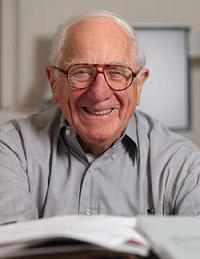Frank L. Parker, Distinguished Professor of Environmental and Water Resources Engineering, Emeritus, has been unanimously chosen to receive the 2018 W. Bennett Lewis Award for Sustainable Energy and Development from the American Nuclear Society at its November conference in Orlando, Florida.
The award recognizes those who have made major lifetime contributions in nuclear science and engineering toward minimizing environmental footprints and attaining long-term global sustainable energy and development. Parker is being recognized for his contributions to global sustainable energy and “the safe and efficient management of nuclear waste through his leadership and untiring efforts during a lifelong career in research and teaching.”

Parker is a pioneer in nuclear waste management and environmental protection. At Vanderbilt, he initially concentrated on thermal pollution and water resources problems, but in later years he focused on radioactive and hazardous chemical waste problems, particularly in the former Soviet Union. This resulted in many publications in Russian and English. He is co-editor and co-author of The Radiation Legacy of the Soviet Nuclear Complex, An Analytical Overview by Nikolai N. Egorov, Vladimir M. Novikov, Frank L. Parker and Victor K. Popov, published in April 2014. Parker was honored with distinguished professor emeritus status at Vanderbilt in 2011.
A 17-year-old U.S. Army volunteer during World War II, Parker left the Army in 1946 and went on to earn a bachelor’s degree from the Massachusetts Institute of Technology and a master’s and doctorate degrees from Harvard University.
Parker served as the first head of Radioactive Waste Disposal Research for the International Atomic Energy Agency where he reached ambassadorial level. He has served as head of the Radioactive Waste Disposal Research Section of Oak Ridge National Laboratory, where his research was the first ecological study of riverine contamination conditions and the first pilot plant development of disposal of high-level radioactive wastes in geological strata, Project Salt Vault.
Parker’s two reports while a senior research fellow of the Beijer Institute of the Royal Swedish Academy of Sciences were the only citations in the radioactive waste section of Madame Gro Harlem Brundltland’s pioneering 1987United Nation’s report, Our Common Future. Brundtland established and was chair of the UN’s World Commission on Environment and Development, best known for developing the broad political concept of sustainable development. The recommendations led to the 1992 Earth Summit in Rio de Janeiro.
Parker was a member of the Scientific Advisory Council for the International Radioecology Laboratory, Slavutych (Chernobyl). He served as a lecturer at Christ College, Oxford, in a United Kingdom Atomic Energy Authority course and as a lecturer in the Italian Physics Society course on nuclear problems at Lake Como. He also was a senior research fellow of the International Institute for Applied Systems Analysis in Laxenburg, Austria.
He was elected to the National Academy of Engineering in 1988, the first from Vanderbilt and the only member for 25 years. He has presented invited papers at the Vatican’s Pontifical Academy of Sciences, the World Federation of Sciences annual meetings on Global Planetary Emergencies and the Blue Ribbon Commission on America’s Nuclear Future. He is a fellow of the American Association for the Advancement of Science and the first engineer elected by eminence to the American Academy of Environmental Engineers.
He has received the Alexander Heard Distinguished Service Professor Award and the Harvie Branscomb Distinguished Professor Award at Vanderbilt. He is the third person to receive the international Wendell D. Weart Lifetime Achievement Award in Waste Management.
The Decommissioning and Environmental Sciences Division of ANS established the W. Bennett Lewis Award in honor of Lewis, a Canadian physicist and nuclear scientist who was the seventh president of the ANS and a charter member. He was a key figure in the development of nuclear power in Canada for nearly three decades. Lewis was the recipient of many awards, including Fellow of the Royal Society of London, Fellow of the Royal Society of Canada, the U.S. Atoms for Peace Award, Royal Medal of the Royal Society of London, and U.S. Department of Energy Enrico Fermi Award.
Created in 1954, ANS is a professional organization of engineers and scientists devoted to the peaceful applications of nuclear science and technology.
Contact: Brenda Ellis, 615 343-6314
Brenda.Ellis@Vanderbilt.edu